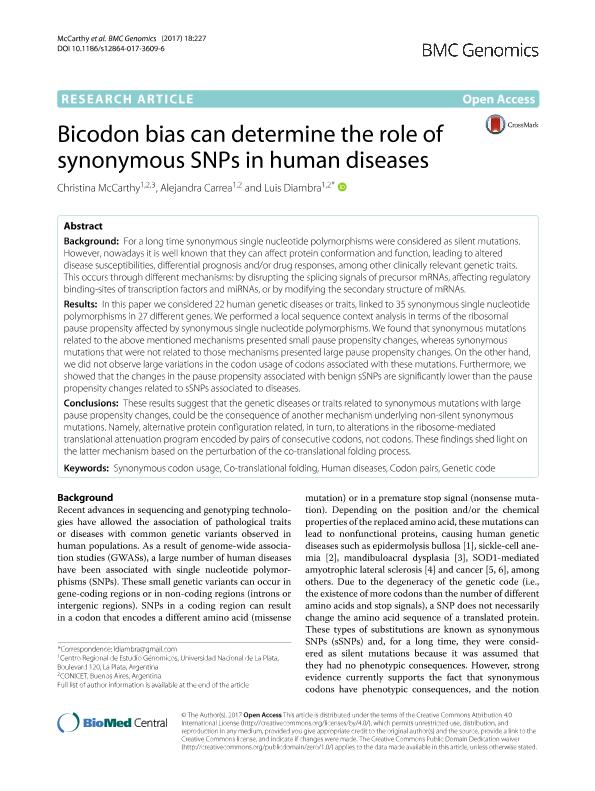Artículo
Bicodon bias can determine the role of synonymous SNPs in human diseases
Fecha de publicación:
03/2017
Editorial:
BioMed Central
Revista:
BMC Genomics
ISSN:
1471-2164
Idioma:
Inglés
Tipo de recurso:
Artículo publicado
Clasificación temática:
Resumen
Background: For a long time synonymous single nucleotide polymorphisms were considered as silent mutations. However, nowadays it is well known that they can affect protein conformation and function, leading to altered disease susceptibilities, differential prognosis and/or drug responses, among other clinically relevant genetic traits. This occurs through different mechanisms: by disrupting the splicing signals of precursor mRNAs, affecting regulatory binding-sites of transcription factors and miRNAs, or by modifying the secondary structure of mRNAs. Results: In this paper we considered 22 human genetic diseases or traits, linked to 35 synonymous single nucleotide polymorphisms in 27 different genes. We performed a local sequence context analysis in terms of the ribosomal pause propensity affected by synonymous single nucleotide polymorphisms. We found that synonymous mutations related to the above mentioned mechanisms presented small pause propensity changes, whereas synonymous mutations that were not related to those mechanisms presented large pause propensity changes. On the other hand, we did not observe large variations in the codon usage of codons associated with these mutations. Furthermore, we showed that the changes in the pause propensity associated with benign sSNPs are significantly lower than the pause propensity changes related to sSNPs associated to diseases. Conclusions: These results suggest that the genetic diseases or traits related to synonymous mutations with large pause propensity changes, could be the consequence of another mechanism underlying non-silent synonymous mutations. Namely, alternative protein configuration related, in turn, to alterations in the ribosome-mediated translational attenuation program encoded by pairs of consecutive codons, not codons. These findings shed light on the latter mechanism based on the perturbation of the co-translational folding process.
Archivos asociados
Licencia
Identificadores
Colecciones
Articulos(CCT - LA PLATA)
Articulos de CTRO.CIENTIFICO TECNOL.CONICET - LA PLATA
Articulos de CTRO.CIENTIFICO TECNOL.CONICET - LA PLATA
Citación
Mccarthy, Cristina Beryl; Carrea, Alejandra; Diambra, Luis Anibal; Bicodon bias can determine the role of synonymous SNPs in human diseases; BioMed Central; BMC Genomics; 18; 1; 3-2017
Compartir
Altmétricas




